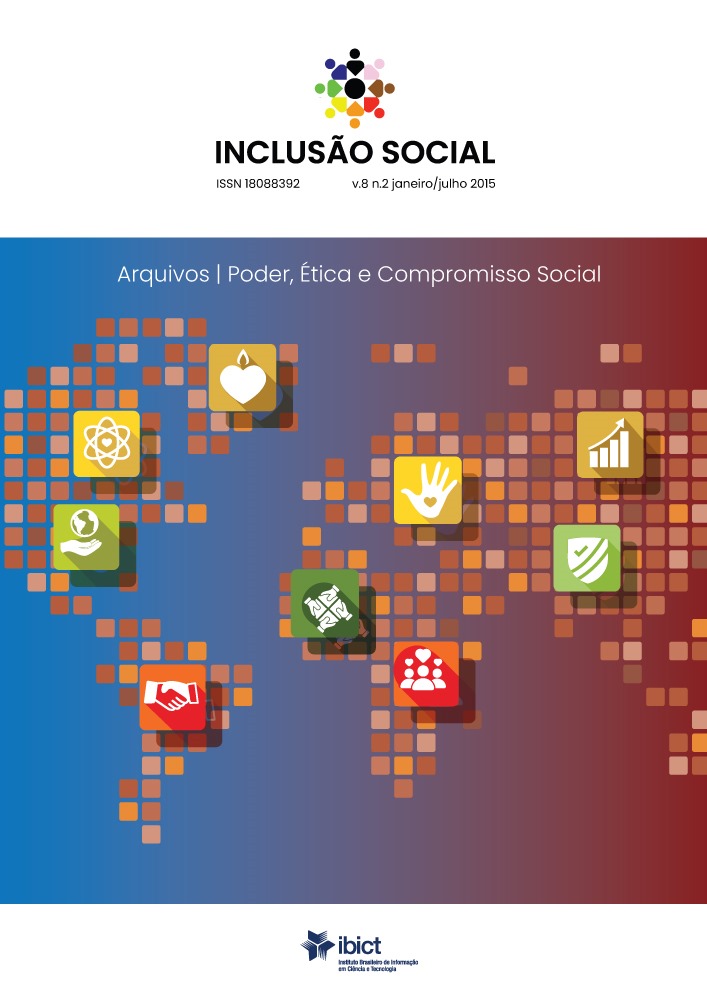“Paper” Citizenships: power, politics and archival social accountability
power, politics and archival social accountability
DOI:
https://doi.org/10.18225/inc.soc.v16i1.7154Keywords:
professional archival ethics, citizenship, politics and power, social accountabilityAbstract
The social invisibility of documents and archives represents one of the greatest difficulties in training technically competent archivists who are socially committed and politically aware of the place they occupy in the power relations that they operate through the technical activities of managing administrative documents. To help overcome these difficulties, we propose more complex readings that, not limited to the strictly disciplinary parameters of Archival Science, allow for a conscious interdisciplinary reflection necessary for diagnoses and propositions of solutions to the technical difficulties they face. Understanding that social phenomena result from diverse institutional actors and interests, as a general rule, external to the administrative unit in which they operate, they will be able to gain an ethical-professional awareness that justifies not only a competent technical professional practice, but also awareness that the extent and complexities of the origins of the problems they face, as well as the actions to correct them, result from political dimensions, rather than from the technical limitations of the professionals involved. Thus, combining theoretical issues with people's daily demands for different types of documents, we believe we can contribute to the achievement of awareness that allows students to see themselves not only as protagonists of social relevance that encourage them to invest in competent and politically-committed technical training, but that are also capable of creating alternative dialogues with social movements, institutions and people about the place of documents, records, archives as fundamental social facilities, and archivists as essential political subjects in the achievement of a more just, democratic and humane society.
References
AMARAL, S. Falsidade documental. 2. ed. rev. São Paulo: Revista dos Tribunais, 1978. 254 p.
MIRANDA, M. P. Consultor Jurídico. Municípios devem ter arquivos públicos para preservar patrimônio. [S. l.], 19 mar. 2017. Site. Available at: https://www.conjur.com.br/2017-mar-04/ambiente-juridico-municipios-arquivos-publicos-preservar-patrimonio/. Access on: 3 jul. 2023.
NOVAES, A. (org). O esquecimento da política. Rio de Janeiro: Agir, 2007.
SILVA, Flávio. “Entre corpos e almas: complexidades de produção, usos e preservação de objetos na formação de Arquivistas, Bibliotecários e Museólogos” In: Revista Fontes Documentais, v. 5, 2022, Ed. Especial: II ABM – Encontro Internacional de Arquivos, Bibliotecas e Museus: do sincretismo à integração. – Aracaju: IFS. p. 47.
Downloads
Published
Issue
Section
License
Copyright (c) 2024 Flávio Leal da Silva

This work is licensed under a Creative Commons Attribution-ShareAlike 4.0 International License.
- A publicação se reserva o direito de efetuar, nos originais, alterações de ordem normativa, ortográfica e gramatical, com vistas a manter o padrão culto da língua, respeitando, porém, o estilo dos autores;
- As provas finais não serão enviadas aos autores;
- Os trabalhos publicados passam a ser propriedade da revista Inclusão Social, ficando sua reimpressão total ou parcial, sujeita à autorização expressa da direção do Ibict;
- Deve ser consignada a fonte de publicação original;
- As opiniões emitidas pelos autores dos artigos são de sua exclusiva responsabilidade;
- Cada autor receberá dois exemplares da revista, caso esteja disponível no formato impresso.





